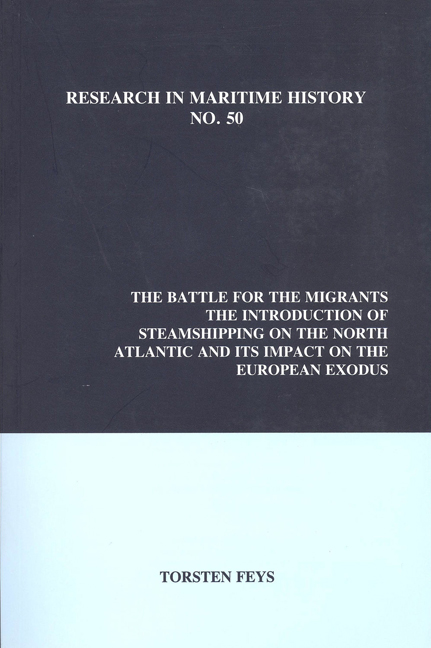 The Battle for the Migrants
The Battle for the Migrants from Part II - The Impact of Steam Shipping on Transatlantic Migration, 1870-1914
Conference agreements in the shipping industry boomed at the end of the nineteenth century. On the eve of World War I, over 100 agreements and consolidations regulated American foreign and domestic waterborne commerce. As contemporaries noted, despite the healthy market, only a few new passenger lines were established on the North Atlantic after 1890, and they did not play an important part in the general expansion of trade. The long-term trend towards consolidation and the legal uncertainty engendered by American legislation favoured mergers. J.P. Morgan extended his business philosophy to the shipping industry with the establishment of the International Merchant Marine (IMM), and its impact on the organization of the steerage market will be analyzed in this chapter. The chapter also takes a closer look at the strategies conferences used against outside lines. How successful was the New York Continental Conference (NYCC) in preventing new or established lines from enlarging or acquiring market share? How did this affect the internal relations among conference members and what was the impact on steerage rates? How did it affect shipping companies’ efforts to rationalize the migrant agent network through conference agreements? As well, the connections among the submarkets and the impact of increased government interference in the organization of migrant traffic will be examined. In the end, the antitrust campaign caught up with the shipping industry during the Progressive Era. The strategies used by the lines to defend the conference system during the federal investigation shed light on the growing fusion among public opinion, business, legislators and academics during this period.
Taking Horizontal Combinations a Step Further: The IMM Merger
The Supreme Court's new interpretation of the Sherman Antitrust Act in 1897 had a boomerang effect, pushing many cartel-like agreements to evolve into great corporate consolidations by way of merger. Looser agreements that looked like pools or cartels became much more vulnerable before federal courts. The shipping industry did not escape this trend, but as Alfred Chandler has noted, economic rather than legal reasons led to the administrative centralizations. Political reasons matter as well, as the interest for shipping in the United States grew after the Spanish-American War had exposed the shortcomings of domestically owned fleet. It triggered speculation about the approval of several important ship subsidies being considered by Congress.
To save this book to your Kindle, first ensure [email protected] is added to your Approved Personal Document E-mail List under your Personal Document Settings on the Manage Your Content and Devices page of your Amazon account. Then enter the ‘name’ part of your Kindle email address below. Find out more about saving to your Kindle.
Note you can select to save to either the @free.kindle.com or @kindle.com variations. ‘@free.kindle.com’ emails are free but can only be saved to your device when it is connected to wi-fi. ‘@kindle.com’ emails can be delivered even when you are not connected to wi-fi, but note that service fees apply.
Find out more about the Kindle Personal Document Service.
To save content items to your account, please confirm that you agree to abide by our usage policies. If this is the first time you use this feature, you will be asked to authorise Cambridge Core to connect with your account. Find out more about saving content to Dropbox.
To save content items to your account, please confirm that you agree to abide by our usage policies. If this is the first time you use this feature, you will be asked to authorise Cambridge Core to connect with your account. Find out more about saving content to Google Drive.